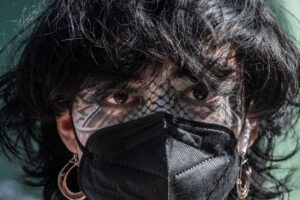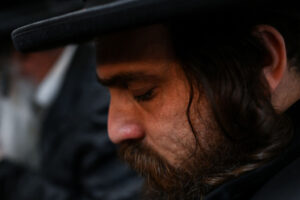Back in the Sixties, it was easy enough for conservatives to take pot shots at radical students. Not only were they out to subvert the state, but their lifestyle seemed calculated to transgress all standards of decency. They were long-haired layabouts who prated of revolution while too smashed on dope to erect a tent pole, let alone a barricade. Freedom came down to free love, while staying in bed for a week wearing nothing but a headband was a critique of the bourgeois fetish of work. You could enrage the Establishment by doing absolutely nothing. Instead of contesting this or that middle-class value, you could negate the whole repressive set-up simply by dropping out. Passivity became a form of activism. Peace meant bone idleness. Utopia lay not in the distant future but in a spliff you were smoking right now.
Yet these laid-back types could also be political militants because their militancy lay in their laid-backness. For them, switching off and chilling out were quite as political as counting votes. What was at stake, as in many political crises, was the definition of politics itself. Did it begin and end at the ballot box, or did it include what you ate and the way you made love?
All of which is to say that the student revolt of the late-Sixties was aimed at cultural revolution, not simply political change. It was aware that genuine political transformation must be rooted in people’s lived experience, not just in their views on agriculture or foreign policy. Culture in the broad sense of customs, values and habits of feeling was the soil in which politics had to bed down. If bedding down in a different sense was so important, it was partly because sex was fun, but also because it belonged to the inner, personal sphere that any political change worthy of the name had to recreate.
In this, the hippies and yippies were taking their cue from the very middle classes they deplored, who had launched their own long cultural revolution in Europe a few centuries earlier. One of the finest achievements of this innovation in morals and manners was the realist novel, though even that rich resource pales in comparison with the mighty intellectual revolution we know as science. What was being transfigured was not only sense but sensibility, as the old aristocratic values of courtesy, hierarchy and lashing the odd peasant yielded ground to thrift, conscience, self-discipline, industriousness and marital fidelity. The Roundheads were gradually ousting the Cavaliers.
There aren’t many peace-and-love druggies among the students currently occupying their campuses. If they are clamouring for peace, it is for a ceasefire in Gaza right now, not for some future world which has transcended violence, and they have no delusions that an end to the slaughter will involve any kind of love-in. They are, in a word, more canny, pragmatic and less idealistic than their Sixties’ forebears, as well as more sceptical of the belief that getting stoned and having it off are the highroad to heaven. In this sense, they are like most other students today, except for sleeping in the cold and being beaten up by the police. Ever since the era of Thatcher and Reagan, students almost everywhere have become more cautious, self-interested and self-seeking, some of which can be attributed to the political times in general and some of it to changes in higher education in particular. Being hugely in debt, as almost all students are these days, inclines you to conservatism. It ties you to the status quo and makes you less likely to step out of line.
It’s therefore all the more impressive that in a bleak season for political radicals, dissent has broken out on a sizeable scale in those bastions of corporate capitalism and managerial gobbledygook which a few years ago were still dimly recognisable as universities. But though the demand for justice has slept, it isn’t dead. In fact, of all human impulses it is one of the hardest to extinguish, however many police riots may try to crush it.
The students who are currently protesting against the massacre of the innocent in Gaza are essentially consumers. For eye-watering fees, they purchase a commodity known as education from institutions for which the value of learning has long since given way to the overriding criterion of value for money. As a former university professor, I used to take advantage of this monetisation of academia by offering students those of my insights into literary works which they could afford. For a mere fiver, for example, they could have one of my moderately interesting but hardly world-shaking comments on the character of Macbeth, while those who could afford to pay four or five times this amount would be treated to a stunningly original analysis of Wuthering Heights. I even ran a hire purchase scheme for those who couldn’t pay for my critical remarks on the nail, allowing them to tip in a small amount each week or even to engage in a spot of barter, exchanging my ideas about Jane Austen for a chocolate cake or an Aran sweater.
Universities, in however privileged, aloof a fashion, were once centres of humane critique, subjecting the priorities of the social order to the test of long-accumulated wisdom and expertise; nowadays, they are almost as locked into the marketplace as Tesco, even if their product is rather less tangible. Today’s students are creatures of this system, and have known no alternative to it, apart from the protests around Iraq; the last large-scale political drama in which a good many British students took part was the miners’ strike of the early Eighties, now some 40 years behind us. Since then, the more politically minded among them have channelled their energies into either ecology or identity politics.
Even so, there are those among them who are reluctant to see their fees being used to prop up Israel’s war. There is, one should note, little or nothing in this for these students themselves. Altruism may not be politically fashionable, but for all the efforts of the rich it isn’t quite extinct. If you’re gay, disabled, a feminist or part of an ethnic minority, your political activity is largely in the service of others; but there’s likely to be a personal dimension to it as well, which isn’t so true of a white middle-class American who protests against the bombing of Palestinian hospitals.
There’s a danger, even so, of war in the Middle East becoming identity politics in New York and California, a danger to which some of the US pro-Palestinian protestors seem alert. In fact, there’s not much that postmodern America can’t turn into a question of identity. A small minority of these dissenters are vile antisemites, so it becomes easy to pin this charge on the movement as a whole. It also becomes possible for some Jewish students to reframe what’s at stake in terms of Jewishness rather than the dismemberment of innocent civilians. It’s known these days as controlling the narrative. If you can’t morally defend Israel’s campaign of terror, then talk about something else such as your right to cross the street. Distraction and displacement are the order of the day. Crowds are redefined as mobs, while non-students who pitch in are branded as foreign agitators. Among some US politicians, the talk is not of starving children but of free speech and freedom of assembly. As American student activists are eager to point out, there’s a lot of discussion in the States about academic freedom at a time when universities in Gaza lie in ruins. Violence on the West Bank goes unmentioned, while violence at Columbia hits the headlines.
Meanwhile, the doublethink continues apace. Yes, the mass killing in Gaza is regrettable, but it’s the only way of rooting out Hamas. In violation of one of the most basic of all ethical principles, the end justifies the means. So, would annihilating a million Palestinians in order to exterminate the enemy be acceptable in principle? Yes, the Right-wing fanatics now running Israel are an embarrassment, but the Israeli state must be defended at all costs. Yes, champions of Palestine have the right to make their voices heard, but too many of them are pro-Hamas zealots in thin disguise, including the teachers and social workers who bring their children from Kennington and Walworth for marches in central London.
Traditionally, students bear the double burden of being both reviled and ridiculed. If they are smeared as social parasites, they are also mocked as idealists with their heads in the clouds. Yet the US student movement of the late Sixties was a power to be reckoned with in national politics, while its counterpart in France brought masses of working people out on the streets and almost unseated a government. Not bad going for a bunch of guys studying Plato or the pancreas.
Disclaimer
Some of the posts we share are controversial and we do not necessarily agree with them in the whole extend. Sometimes we agree with the content or part of it but we do not agree with the narration or language. Nevertheless we find them somehow interesting, valuable and/or informative or we share them, because we strongly believe in freedom of speech, free press and journalism. We strongly encourage you to have a critical approach to all the content, do your own research and analysis to build your own opinion.
We would be glad to have your feedback.
Source: UnHerd Read the original article here: https://unherd.com/



